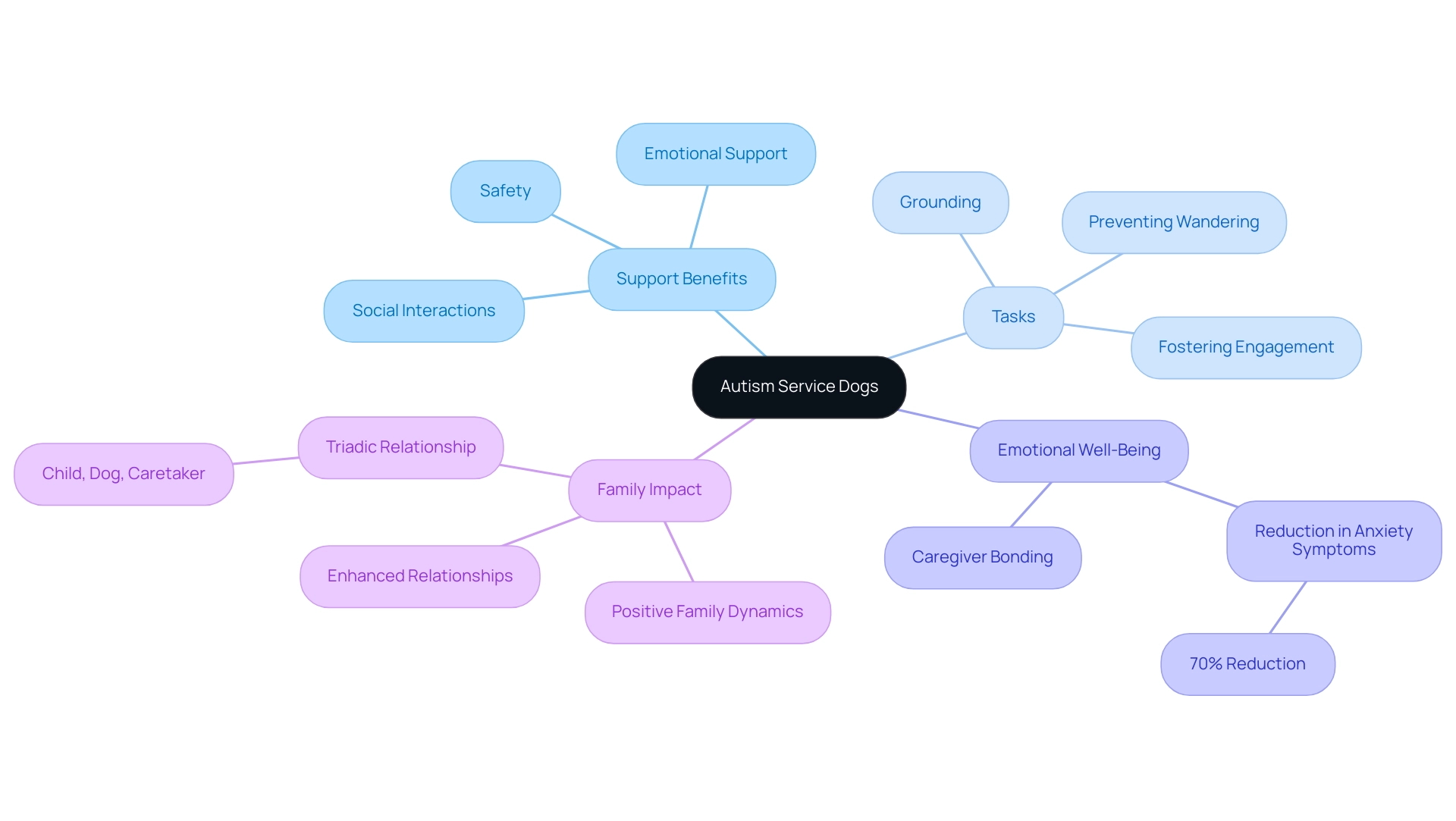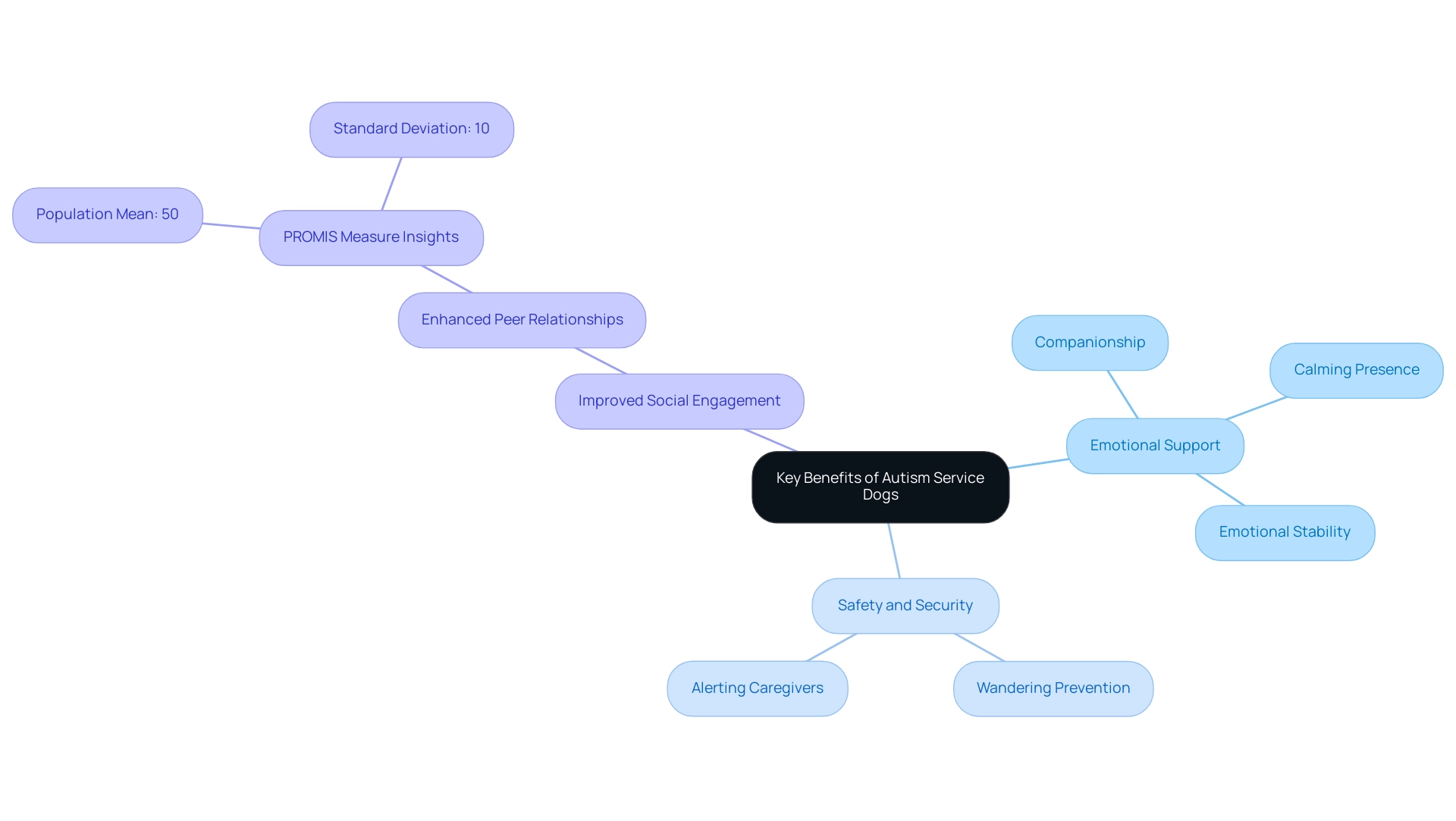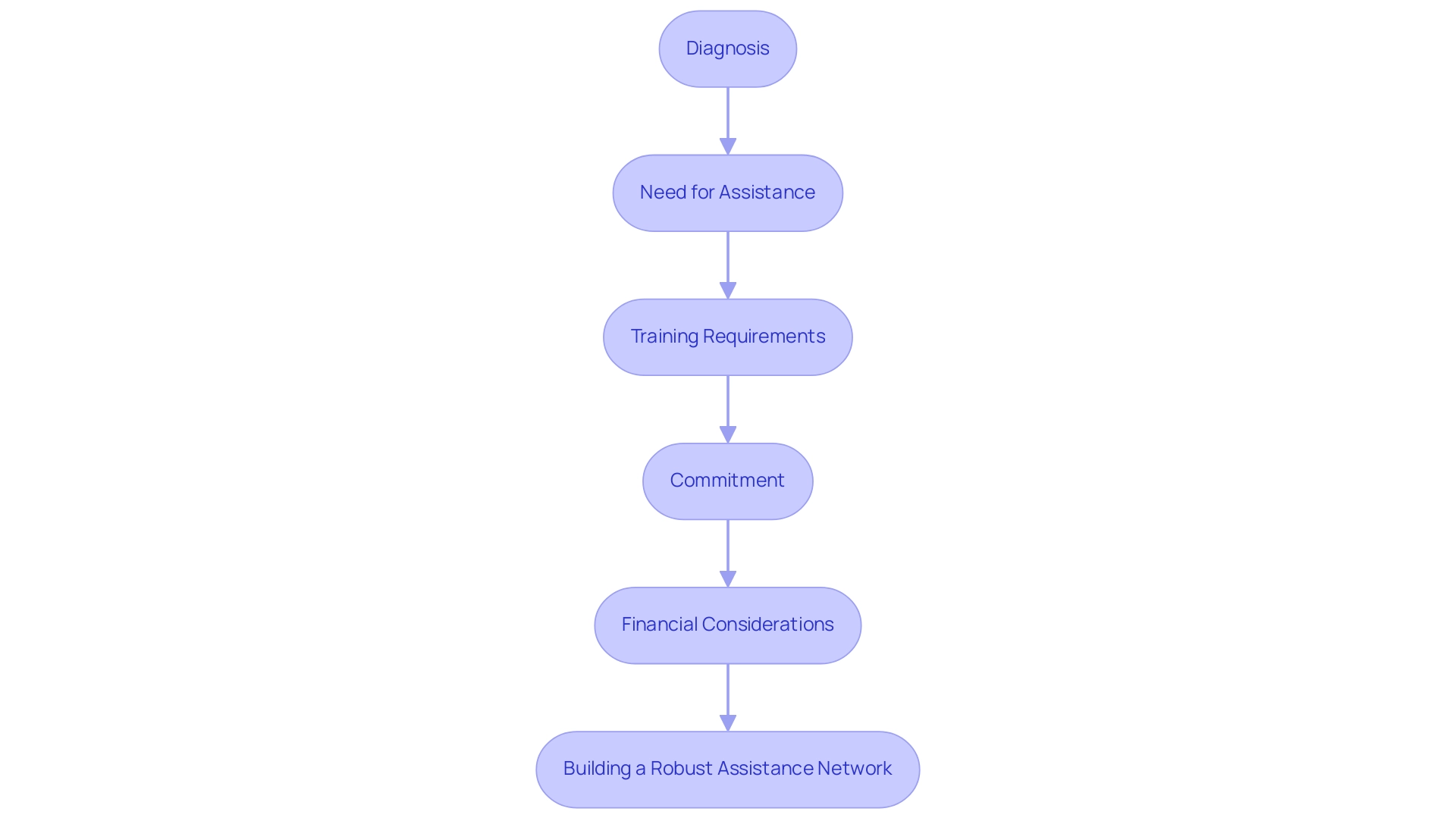Introduction
In a world where the challenges of autism spectrum disorder can feel overwhelming, autism service dogs emerge as transformative allies, providing not just companionship but also essential support. These specially trained canines play a crucial role in enhancing the lives of individuals with autism, offering emotional grounding, safety, and fostering social connections. By addressing specific needs and alleviating anxiety, service dogs become integral to family dynamics, enriching both the lives of children and their caregivers.
As families explore the process of integrating a service dog into their lives, understanding the myriad benefits and navigating the application criteria can empower them to make informed decisions that lead to profound positive changes.
Understanding Autism Service Dogs: A Lifeline for Individuals with Autism
Assistance canines specifically trained provide invaluable support to individuals with spectrum condition (ASD). These canines are more than friends—they are vital assistance resources that help alleviate the difficulties encountered by individuals with developmental disorders. One caretaker shared, 'We are very excited that we have gotten the opportunity to get a service dog and strongly believe that it would change our child's life and ours too.'
Assistance animals offer emotional support, promote social interactions, and enhance safety, significantly enhancing the quality of life for individuals with developmental disorders and their families. Their training includes tasks such as:
- Grounding their owners during moments of anxiety
- Preventing wandering
- Fostering social engagement
This makes them a lifeline for many families navigating the complexities of developmental disorders.
Research indicates that assistance animals can lead to a 70% reduction in anxiety symptoms among children with autism, highlighting their profound effect on emotional well-being. Caregivers who develop a close emotional bond with their assistance dog often experience fewer negative impacts on daily activities. According to recent statistics, the correlation between emotional closeness and daily challenges is minimal, underscoring the positive influence these dogs have.
The Canine Companions Assistance Dog Placement program exemplifies the structured approach to assistance dog assignments. Provided at no cost, the process includes a multi-step application and training for both the dog and the caretaker. Participants describe continuous assistance and a strong triadic relationship among the autistic child, the assistance dog, and the caretaker, enhancing family dynamics and fostering a positive environment. As mentioned by Dr. Smith, a specialist in developmental disorders, 'The presence of a assistance dog not only aids the child but also reinforces the family unit, fostering deeper connections and understanding.'
In essence, assistance canines are game-changers, providing comprehensive support that extends beyond the individual to positively impact the entire family.

Key Benefits of Autism Service Dogs: Enhancing Daily Life
Autism assistance animals provide steadfast affection and companionship, greatly reducing sensations of isolation and unease. Their calming presence fosters emotional stability, especially during stressful situations. According to Marguerite E. O’Haire, various studies seek to assess the impacts of these assistance animals on children with developmental disorders and their caregivers, emphasizing the emotional advantages they offer. Furthermore, these assistance animals improve safety and security by stopping wandering, a frequent issue among individuals with developmental disorders. Their ability to stay close and alert caregivers can be crucial in maintaining a secure environment.
Statistics indicate a positive correlation between the presence of assistance animals and enhanced peer relationships among children with autism. The PROMIS Peer Relationships measure, with a population mean of 50 and a standard deviation of 10, highlights this improvement, implying that assistance animals play a vital role in enhancing emotional assistance and social engagement.
Case studies, such as those reported by the U.S. Department of Health and Human Services on complementary therapies in hospice care, show that pet therapy can be profoundly beneficial. In nearly 60% of hospice care providers offering pet therapy, patients experience significant emotional relief, further supporting the role of assistance dogs in providing emotional support while simultaneously enhancing safety for vulnerable populations.

Navigating the Process: Criteria for Applying for an Autism Service Dog
When contemplating seeking a support dog, parents must be aware of the criteria and steps involved in the process. Here are key considerations:
-
Diagnosis: A formal determination of spectrum disorder from a qualified professional is typically required. This guarantees that the assistance dog will be suitably matched to the child's specific needs.
-
Need for Assistance: Applicants must clearly show that their child would gain from a support dog in managing specific challenges related to developmental disorders. This can include improving safety, reducing anxiety, or assisting with social interactions. According to the PROMIS Peer Relationships measure, children with developmental disorders often face challenges in peer relationships, which a service dog may help address.
-
Training Requirements: Service animals undergo extensive training to ensure they can effectively assist children with autism. Training can take anywhere from 6 months to a year, focusing on basic obedience, public behavior, and specialized tasks. As noted by the Northern Virginia Resource Center for Deaf & Hard of Hearing Persons, the training process is comprehensive, and parents should seek organizations that offer fully trained dogs or provide support in training their own dog.
-
Commitment: Owning a assistance dog means a long-term commitment to the dog's care, training, and maintenance. Daily routines and responsibilities must be adjusted to accommodate the dog, ensuring its physical and emotional well-being.
-
Financial Considerations: The cost of acquiring a assistance dog can be significant, often including initial training, ongoing care, and specialized equipment. Reports indicate that caregivers believe higher expenses linked to dog care can result in heightened caregiver strain. Parents should explore various funding options, such as grants or nonprofit organizations, that can help alleviate these expenses.
-
Building a robust assistance network: Engaging with professionals, trainers, and other parents who have experience with assistance dogs can provide invaluable guidance and help. This network can provide practical advice and emotional encouragement throughout the application process.
Understanding these considerations can empower parents to make informed decisions and successfully navigate the journey of obtaining a service dog for their child, even as studies like "Child Social Functioning and Service Dogs" indicate that while the presence of a service dog may not significantly enhance social functioning, the support and companionship they provide can still be invaluable.

Conclusion
The integration of autism service dogs into the lives of individuals with autism represents a significant shift towards enhanced emotional and physical well-being. These specially trained canines not only provide companionship but also play a vital role in managing anxiety, preventing wandering, and fostering social interactions. The evidence supporting their positive impact is compelling, with studies indicating substantial reductions in anxiety levels and improvements in family dynamics.
Navigating the application process for a service dog may seem daunting, but understanding the criteria and requirements can empower families to make informed choices. From ensuring proper diagnosis to recognizing the long-term commitment involved, each step taken towards acquiring a service dog can lead to transformative changes in daily life.
Ultimately, autism service dogs are more than just pets; they are lifelines that enhance the quality of life for children with autism and their families. By fostering emotional stability, improving safety, and strengthening social connections, these remarkable animals create a supportive environment where individuals can thrive. Embracing the journey of integrating a service dog can lead to profound positive changes, enriching the lives of all involved.




